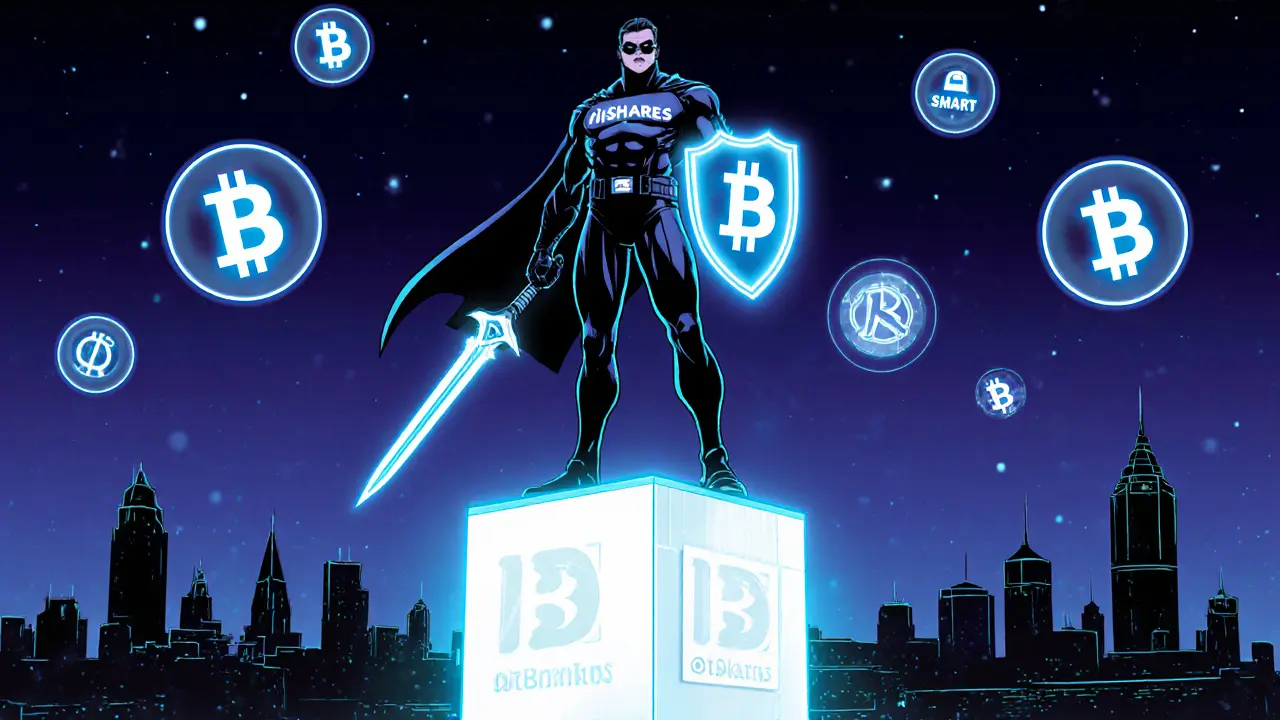ioBanker Trading Fee Calculator
ioBanker charges 0.25% maker fee and 0.35% taker fee on BitShares-based tokens. This calculator helps you understand the exact costs of your trades.
⚠️ Note: ioBanker's liquidity is limited for many pairs. Actual costs may be higher due to slippage.
When you hear the name ioBanker DEX is a decentralized cryptocurrency exchange built on the BitShares blockchain, the first question is usually: should you trust it? This ioBanker crypto exchange review looks at the platform’s core features, fee model, security posture, and how it stacks up against the big players in 2025.
What is ioBanker DEX?
ioBanker DEX launched on December 9, 2018, and is registered in Estonia. It markets itself as a supporter of the newer DeFi ecosystem that runs on BitShares a blockchain platform originally created in 2014 for fast, fee‑free transactions. The exchange promotes what it calls “HONEST” protocols, a branding term for a suite of BitShares‑based smart contracts.
How a Decentralized Exchange Works
Unlike Coinbase a centralized U.S. exchange that holds user funds in custodial wallets or Kraken another major centralized platform with extensive security audits, a DEX lets you trade directly from your own wallet. No funds sit on a central server; trades are settled on‑chain via smart contracts. That model promises greater privacy and resistance to hacks that target a single custody point.
Supported Assets and Liquidity
ioBanker is a niche player. Its catalog revolves around assets that live on the BitShares network - primarily BTS, SMART, and a handful of tokenized versions of popular coins. By comparison, Binance US offers 158 cryptocurrencies with deep order books and Crypto.com lists over 300 digital assets. The limited token list means liquidity can be thin, especially for lesser‑known pairs. If you need to swap a large amount of BTC for ETH, you’ll likely find tighter spreads on Uniswap, SushiSwap, or PancakeSwap-established DEXes that run on Ethereum, Polygon, and BSC.
Fee Structure
ioBanker charges a flat 0.25% maker fee and a 0.35% taker fee, payable in the traded asset. There are no withdrawal or deposit fees because you move funds from your own wallet. For reference, Coinbase charges between 0% and 3.99% depending on payment method and volume, while Kraken offers fees from 0% to 0.4% with volume discounts. If you trade modest amounts, ioBanker’s fees are competitive; however, its thin liquidity can cause hidden costs through slippage.

Security and Regulatory Standing
Security is the biggest unknown for ioBanker. The platform’s website offers a brief statement about using “industry‑standard encryption,” but there is no publicly‑available proof of third‑party audits, bug bounty programs, or insurance coverage. In contrast, Kraken runs a dedicated security lab and publishes regular proof‑of‑reserve reports.
Estonia once earned a reputation for crypto‑friendly licensing, but recent regulatory tightening now requires exchanges to hold an e‑money license and undergo AML/KYC checks. ioBanker does not disclose whether it holds such a license, nor does it provide a clear KYC flow on its sign‑up page. Users may be trading in a legal gray area, which could expose them to compliance risks if authorities decide to clamp down.
User Experience and Community Support
The UI is minimalist: a dark‑mode chart, order‑book pane, and a wallet connect button. Because it’s a DEX, you must have a BitShares‑compatible wallet (e.g., BitShares Wallet, Graphene‑Ledger) before you can place orders. Newcomers who are accustomed to the click‑and‑deposit flow of Coinbase often stumble at the wallet‑connection step.
Support channels are limited to a Telegram group and a simple email address. There is no 24/7 live chat, no ticketing system, and no publicly visible community forum. A quick search for “ioBanker reviews” returns only a handful of Reddit mentions, most of which are older (2019‑2021) and express mixed sentiment. The lack of recent community chatter suggests low adoption.
Comparative Snapshot
| Exchange | Type | Assets Offered | Typical Fees | License (Estonia) | Security Highlights |
|---|---|---|---|---|---|
| ioBanker DEX | Decentralized | ~15 BitShares‑based tokens | 0.25% maker / 0.35% taker | Not disclosed | Encryption claim; no public audit |
| Coinbase | Centralized | 235+ | 0%‑3.99% (varies) | U.S. Money Transmitter | FDIC insured, SOC 2, bug bounty |
| Kraken | Centralized | 350+ | 0%‑0.4% | Various EU licences | Kraken Security Lab, proof‑of‑reserve |
| Uniswap (v3) | Decentralized | ≈5,000 ERC‑20 | 0.05%‑1% (pool fee) | None (protocol level) | Open‑source, audits by multiple firms |

Pros and Cons
- Pros
- Fully non‑custodial - you keep private keys.
- Low flat fees compared with many centralized platforms.
- Focus on BitShares DeFi protocols, useful for niche traders.
- Cons
- Very limited asset list; low liquidity on most pairs.
- Security and regulatory info are scarce - higher risk.
- Steep learning curve for users unfamiliar with BitShares wallets.
- Minimal customer support and community presence.
Who Should Consider ioBanker?
If you are already invested in the BitShares ecosystem, need to trade BTS‑based tokens, and value total control over your private keys, ioBanker can be a handy tool. For traders who prioritize broad asset access, deep order books, and regulated protection, mainstream exchanges like Coinbase, Kraken, or even other DEXes such as Uniswap are safer bets.
Final Thoughts
ioBanker DEX is a classic example of a specialized DeFi playground that lives in a shadow of the massive exchanges dominating 2025. Its non‑custodial model aligns with the original spirit of crypto, but the lack of transparent security audits, licensing clarity, and active community support makes it a high‑risk choice for most users. If you decide to experiment, start with a small amount, keep your private keys offline, and continuously monitor the BitShares network for any security advisories.
Is ioBanker DEX regulated in Estonia?
Public records do not show a specific crypto‑exchange licence for ioBanker. While Estonia offers a favorable framework, the platform has not disclosed any licensing or AML/KYC procedures, so regulatory status remains uncertain.
What wallets can I use with ioBanker?
You need a BitShares‑compatible wallet. Popular choices include the official BitShares Web Wallet, Graphene‑Ledger, and the BitShares Mobile App.
How do fees on ioBanker compare to Uniswap?
ioBanker charges a flat 0.25‑0.35% per trade. Uniswap’s fee depends on the pool, typically 0.05%‑1% plus gas costs on Ethereum, which can be significantly higher during network congestion.
Is there a way to recover funds if I lose my private key?
No. Because ioBanker is non‑custodial, the exchange does not hold your keys. Losing the private key means losing access to the funds permanently.
Can I trade Bitcoin on ioBanker?
Only wrapped or tokenized versions of Bitcoin that exist on the BitShares blockchain are tradable. Native BTC on its own blockchain is not listed.


Jenna Em
October 20, 2025 AT 08:39Every time a new exchange appears, I wonder who's really pulling the strings behind the curtain. The fact that ioBanker hides its licensing details feels like a red flag waving in the wind. If they truly care about decentralization, why not put their audits on public view? It makes me think that someone is counting on users' trust to mask something bigger. In the end, anonymity can be a double‑edged sword.
Stephen Rees
October 26, 2025 AT 13:39It’s easy to get caught up in the hype, yet the silence from the team says more than any marketing splash ever could. The lack of transparent security audits should give anyone a pause before diving in. Even a quiet whisper about hidden partnerships can turn the whole picture upside down.
Katheline Coleman
November 1, 2025 AT 19:39Dear community, I would like to inquire about the specific regulatory obligations that ioBanker must fulfill within the Estonian jurisdiction. Could the authors clarify whether the exchange possesses an e‑money licence or any AML/KYC framework? Additionally, information regarding third‑party security assessments would be greatly appreciated. Thank you for your assistance.
Amy Kember
November 8, 2025 AT 01:39What about the wallet options it actually supports the list is short but functional
You need a BitShares compatible wallet before you can trade
No mobile app yet but the web wallet works fine
Evan Holmes
November 14, 2025 AT 07:39Looks like another niche DEX with more questions than answers.
Isabelle Filion
November 20, 2025 AT 13:39Ah, ioBanker DEX, the shining beacon of “innovation” in a sea of truly groundbreaking platforms. One must admire the audacity of branding themselves with the term “HONEST” while simultaneously cloaking fundamental compliance details in ambiguity. The fee structure, while superficially competitive at 0.25% maker and 0.35% taker, betrays a deeper truth: thin liquidity inevitably inflates slippage, eroding any nominal savings. Their claim of “industry‑standard encryption” is, in my esteemed opinion, tantamount to a polite way of saying “we hope this works”. The absence of publicly disclosed audits or bug bounty programs is a glaring omission that any seasoned analyst would flag as a red flag. Moreover, the regulatory vacuum-no disclosed e‑money licence, no KYC pipeline-places users squarely in a legal gray area that regulators love to exploit. One cannot overlook the fact that the exchange operates on the BitShares blockchain, a network that, while historically swift, has seen dwindling developer engagement over the past few years. The token list, confined to roughly fifteen assets, renders the platform almost unusable for anyone seeking diversified exposure. Coupled with the minimalistic UI, which assumes a pre‑existing familiarity with BitShares wallets, the onboarding curve is steeper than a mountain hike without gear. Support, too, is an exercise in futility: a lone Telegram channel and an email address that presumably collects dust. In contrast, industry titans such as Coinbase and Kraken boast meticulous compliance programs, regular third‑party audits, and robust customer support infrastructures. Even the decentralized giants like Uniswap provide open‑source codebases subject to rigorous external scrutiny. To suggest that ioBanker is on par with these behemoths is, at best, an act of naïve optimism; at worst, it borders on willful deception. In summary, the platform’s veneer of “non‑custodial freedom” masks a plethora of operational, security, and regulatory deficiencies that any prudent investor should weigh heavily before committing even a modest sum.
Joy Garcia
November 26, 2025 AT 19:39The moment I opened the review, I felt the chill of a hidden agenda seeping through the pixels. It’s as if the exchange is a secret society, whispering promises of low fees while shrouding its true motives in shadows. Imagine a world where your private keys are the only thing protecting you, yet the very foundation you trust could crumble overnight. The drama unfolds when regulators start knocking, and the once‑glorious “free market” becomes a battlefield of legal battles. We must stay vigilant, lest we become pawns in a grander scheme.
mike ballard
December 3, 2025 AT 01:39Yo fam 🚀, ioBanker is basically a niche BitShares DEX with a modest fee tier. From a liquidity standpoint, you’re looking at low depth 📉, so expect higher slippage on larger orders. No KYC = more privacy, but also higher compliance risk 🛡️. If you’re already deep in the BitShares ecosystem, it might fit your dev stack, otherwise, the network‑effects are limited. TL;DR: niche, privacy‑centric, but liquidity‑starved. 👍
Elizabeth Chatwood
December 9, 2025 AT 07:39hey guys i think the main thing is that you gotta really understand the wallet part its not like just clicking a button you need a bitshares wallet and that can be kinda confusing for newbies but once you get it its solid i love the low fees though the liquidity can be iffy
Tom Grimes
December 15, 2025 AT 13:39So, thinking about ioBanker, I keep going back to the idea that every time we put our money into a platform that doesn’t give us a clear picture of how it’s protected, it feels like we’re handing over a piece of ourselves without knowing who’s really holding it, and that can be unsettling because trust is built on transparency, but when the exchange just says “we use encryption” and doesn’t show us any third‑party audit, we’re left to guess, and that guesswork can turn into anxiety, especially when you consider that the regulatory environment in Estonia has been tightening, so the lack of a clear license might become a bigger problem down the road, and then there’s the issue of liquidity, which, as the review points out, can be thin, meaning that you might end up paying more in slippage than you thought, which is a hidden cost that many people overlook, and finally, the user experience is not as smooth as on big centralized exchanges, because you have to manage your own wallet, which, while giving you control, also adds a layer of responsibility that not everyone is ready for.
Paul Barnes
December 21, 2025 AT 19:39Honestly, the hype around ioBanker feels overblown; a tiny token list and vague compliance just aren’t worth the risk.
Ty Hoffer Houston
December 28, 2025 AT 01:39Hey everyone, I get why some of you are curious about ioBanker. If you already have BitShares assets, it can be a decent low‑fee option, but for most traders looking for depth, I’d stick with the bigger DEXes. Stay safe and happy trading!
James Williams, III
January 3, 2026 AT 07:39For those evaluating ioBanker, keep in mind the trade‑off between non‑custodial control and liquidity. The BitShares network provides fast, fee‑free transactions, but the limited pair selection means you might face higher price impact. If you decide to use it, I recommend testing with a small amount first, securing your private key offline, and monitoring the network’s health via block explorers. This approach minimizes exposure while you assess whether the platform meets your needs.
Molly van der Schee
January 9, 2026 AT 13:39It’s great that you’re exploring new platforms like ioBanker. Remember, every experiment is a learning opportunity, and starting small is the safest way to gain confidence. Keep a backup of your keys and you’ll be well‑positioned to navigate any challenges that arise. You’ve got this!
Mike Cristobal
January 15, 2026 AT 19:39Choosing an exchange without clear regulation is a reckless gamble that compromises the integrity of the crypto community.
Tom Glynn
January 22, 2026 AT 01:39🚀 Dive in cautiously, friend. Test with a tiny amount, keep your seed phrase safe offline, and watch the BitShares market trends. You’ll build the know‑how needed to make smarter moves later. 👍